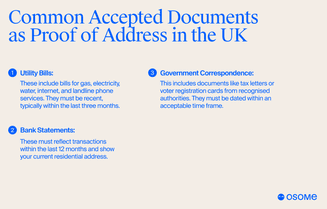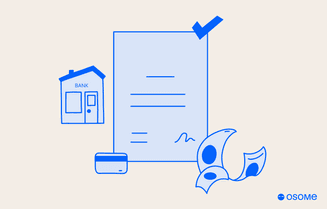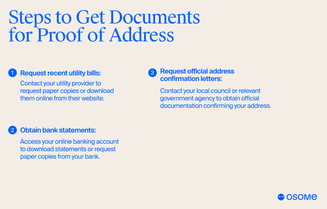What Is a Proof of Address and How To Easily Get It?
- Published: 15 November 2024
- 8 min read
- Running a Business


Heather Cameron
Author
Heather believes in the power of great storytelling and is here to craft compelling copy that informs and inspires readers. With an extensive background in digital marketing, she has experience writing for various industries, from finance to travel. As Osome’s copywriter, Heather creates content that empowers entrepreneurs and small business owners to boost their business with expert guidance, helpful accounting tips and insights into the latest fintech trends.

Yinghua Luo
Reviewer
Yin Luo is our Operations Manager based in the UK. She keeps our UK team running like a well-oiled machine and ensures our content resonates with our British audience. Before moving to operations, Yin had over 10 years of accounting experience and is an ACCA-qualified accountant. In her current role, she is our go-to expert for making complex topics easy to understand. Yin carefully reviews our UK-focused articles, ensuring they are accurate, relevant, and packed with actionable advice to help your business thrive on this side of the pond.
Proof of address confirms where you live and is essential for tasks like opening a business account or applying for a loan, as many UK authorities typically require this verification. Documents like utility bills, bank statements, and government letters are commonly accepted. This guide covers what qualifies as proof of address and how to quickly get the right documents.
Key Takeaways
- Proof of address is crucial for various legal and administrative procedures, often required by financial institutions and employers. Always check the specific requirements from the recognised authority requesting the proof to ensure you provide the correct documents.
- Accepted documents include various utility bills, insurance documents, credit card statements, government correspondence, tenancy agreements, and employer letters, all needing to meet specific criteria for validity.
- For individuals lacking traditional documents, alternative methods like utility registration for newcomers or digital documents may serve as valid proof of address.
What Is a Proof of Address?
Proof of address confirms your residence and verifies where you live. Unlike proof of residency, which serves different purposes, it is primarily used for various administrative and legal requirements. Businesses and institutions rely on it to comply with regulations, communicate effectively with clients, and verify identity.
Institutions often require proof of address when you apply for a bank account, loan, or job to ensure eligibility and comply with legal obligations. Financial institutions need these documents to adhere to anti-money laundering and counter-terrorism financing regulations. Opening a bank account in the UK also requires a valid photo ID, such as a driving licence, and a visa or residency permit with a UK address.
A valid proof of address is a small but essential part of numerous administrative tasks. So if you're planning to establish your business presence in the UK, our company registration services can assist you in streamlining the incorporation process. We'll handle the legalities and ensure compliance with local regulations.
You might need one or two acceptable documents to prove your address, such as a council tax bill and bank statement. A bill in your name, setting up utility services as a newcomer, or a registered business address for official correspondence are some ways to demonstrate proof of address. Knowing these requirements ensures you have the appropriate proof on hand.
What Documents Are Accepted As a Proof of Address?
Various documents can serve as proof of address, each with specific criteria for validity. Common examples include utility bills, bank statements, and government correspondence. These documents must be original, current, and issued by reputable sources.
Here are the specifics of these document types.

Utility bills
Utility bills are among the most widely accepted forms of proof of address. These include bills for:
- gas
- electric
- water
- Internet
- landline phone services
To be valid, these bills must be recent, and typically issued by a utility company within the last three months. If you’ve opted for paperless billing, you can request a paper copy online from your utility provider.
Many utility providers and government agencies have online portals. You can easily download a utility bill from these platforms. Having the most recent utility bill readily available helps you quickly provide proof of your current address when needed.
Bank statements
Bank statements are another commonly accepted proof of address. These statements must reflect transactions within the last 12 months to be considered valid. The bank account statement must show your current residential address to avoid issues. Generally, bank statements older than three to four months are not accepted.
Accessing these statements is straightforward. Most banks provide online access where you can download statements for specific periods. If needed, you can also request paper versions to be sent by mail.
Government correspondence
Government correspondence or a letter confirming voter registration can serve as proof of address if issued by a recognised local authority. A document must come from recognised authorities to be valid. Such official documents are essential for validating your residential address, especially in formal or legal settings.
Government-issued identification and correspondence must include your full name, current home address, and be dated within an acceptable time frame to meet the institution’s requirements.
Alternative Proof of Address Methods
Sometimes, traditional identity documents like a utility bill or a recent bank statement might not be available. In such cases, various alternative methods can be used to provide proof of address.
These alternatives include documents showing family members’ names and proof of relationship or a council tax bill dated within the past 12 months.
Tenancy agreement
A tenancy agreement, as an official document, outlines the rental agreement terms between a landlord and tenant and can include an address printed for proof. This agreement can confirm residency at a specific address, making it a valid proof of address. A new lease or rental agreement can act as proof of address for those who have recently moved.
Ensure tenancy agreements include your full name, home address, and the terms of the rental period, as these are typically required for validity. This legal document serves not only to verify your residence but also to provide a clear record of your tenancy.
Employer letters
Letters from employers can also be utilised as valid proof of address. A contract letter issued by employers should be on official company letterhead and include details such as your name, address, and period of employment. Employers’ letters are particularly useful for those who may not have traditional address documents in their name.
Ensure the letter is signed and dated to meet the necessary criteria for proof of address.
Digital documents
Many organisations, including educational institutions and different banks, now accept electronic copies of statements as acceptable proof of address. Online bank statements, for example, are often used to verify an individual’s address. Most banks provide access to digital statements that can be viewed and downloaded instantly.
Some banks even allow automatic monthly bank statement deliveries via email. These documents are convenient and widely accepted as valid proof of address.
Special Cases and Solutions
Certain situations can make it challenging to obtain traditional proof of address documents.
In these cases, alternative solutions and special considerations can help.

New residents
Newcomers can set up utilities and register for council tax before moving to obtain timely proof of address. If nothing is registered in your name, alternative verification methods or contacting your bank to confirm specific requirements can be beneficial.
If your bills are not in your name, reach out to your chosen bank or the relevant institution for guidance on acceptable proof. Additionally, registering to vote online can provide voter registration cards by mail, serving as a proof of address document.
Recently moved
Promptly update your address with utility providers, banks, government agencies, and employers after a move. Failing to do so can cause delays in providing proof of address. A new lease agreement can serve as valid proof if you’ve recently moved.
Ensure any relevant document showing your current address is updated before gathering proof of address documents. This step is critical to avoid any complications when the need to verify your address arises.
No physical documents
If you lack physical documents, contact your utility company or other providers to request paper versions that may be accepted. Many utility and financial institutions provide easy methods to order paper statements online.
Verify if the institution requesting proof of address accepts printouts or online submissions, providing a convenient solution for those relying on a digital document.
How To Obtain Documents As Your Proof of Address?
Obtaining documents for proof of address involves straightforward steps, varying by document type.

Requesting utility bills
Request recent utility bills by contacting your provider through customer service or their website. Most utility companies have online portals where you can download recent bills. If online access isn’t available, customer service can assist.
Utility bills are essential documents for verifying your current address, so it’s important to ensure you have the most recent utility bill versions available.
Getting bank statements
Banks typically allow customers to order paper statements through an online bank account. Log in to your online banking, select the specific month and year to download statements, or request a paper version to be mailed. Some banks may require identity verification before granting access to online statements.
Official letters from government agencies
Request official address confirmation letters through your local council or relevant government agency. Contact the appropriate local authority or agency through their designated communication channels.
Many government agencies allow online requests for official letters via their websites. Ensure you have the necessary identification and proof of residency when requesting.
How To Ensure Validity of Your Proof of Address?
Meeting specific criteria set by the requesting institution ensures the validity of your proof of address.
Document criteria
Proof of address documents must include your full name, current address, and the date of issue. Ideally, they should be dated within the last three months. Original documents are preferred over copies.
The legitimacy of proof of address can be confirmed through checks, such as verifying the residential address online. Meeting these criteria helps avoid issues with acceptance.
Avoiding common pitfalls
Avoid using outdated documents, as they are likely to be rejected. Documents lacking security features can be easily forged, making them unreliable. Some institutions may not accept photocopies, so provide original documents whenever possible.
Ensure your documents are up-to-date and include any necessary security measure, so you can avoid common pitfalls and ensure acceptance in legal proceedings or with a judicial authority.
However, it is much more reliable to outsource all the paperwork to professionals. Osome offers comprehensive company registration services to guide you through the process. We'll ensure your company is set up for success in the UK market. Contact us today to learn more!
Summary
In summary, obtaining proof of address involves understanding the types of documents accepted, ensuring they meet specific criteria, and being aware of alternative methods and special cases. Utility bills, bank or credit card statements, and government correspondence are among the most commonly accepted document types.
By following the steps outlined in this guide, you can easily obtain, validate, and use proof of address documents. Staying informed and prepared will help you navigate various administrative and legal requirements with confidence.






